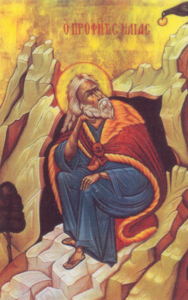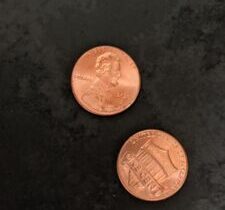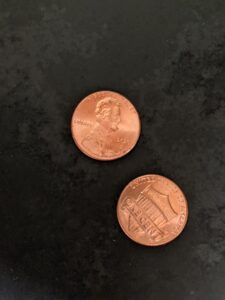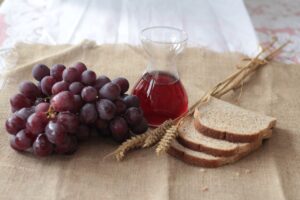“All er Nothin”
 When I was a little girl, getting ready for first grade, my mother was quite worried. I loved to sing. This would not typically be an issue, but two of my favorite songs were from the musical Oklahoma. The songs in question were not something lovely like “Oh what a beautiful morning,” or something rousing like “Oklahoma.” No, my favorites were the ones sung by Ado Annie, the young woman with a less than stellar reputation for faithfulness or prudence in relationships. These songs, especially in the Broadway play version we had on our record, were quite risqué. Mom was afraid I would sing them to “Sister” and scandalize her (whoever she turned out to be). As soon as the movie version, with more family-friendly lyrics, was available, she bought it for us and that was the record I was allowed to enjoy.
When I was a little girl, getting ready for first grade, my mother was quite worried. I loved to sing. This would not typically be an issue, but two of my favorite songs were from the musical Oklahoma. The songs in question were not something lovely like “Oh what a beautiful morning,” or something rousing like “Oklahoma.” No, my favorites were the ones sung by Ado Annie, the young woman with a less than stellar reputation for faithfulness or prudence in relationships. These songs, especially in the Broadway play version we had on our record, were quite risqué. Mom was afraid I would sing them to “Sister” and scandalize her (whoever she turned out to be). As soon as the movie version, with more family-friendly lyrics, was available, she bought it for us and that was the record I was allowed to enjoy.
Of Ado Annie’s two songs, “I Cain’t Say No” and “All Er Nothin,” the one that comes to mind and is running through my head after looking at the readings for the Thirteen Sunday in Ordinary Time, is “All Er Nothin.” Annie’s boyfriend, Will, has just returned from the big city, Kansas City, with tales of what “modren livin” is going to be – indoor plumbing, gas buggies goin by theirselves, buildings twenty stories high, etc. Will has heard rumors that Annie hasn’t exactly been the most faithful girlfriend while he was away. He confronts her in the song “All Er Nothin,” declaring “With me it’s all er nothin. Is it all er nothin with you?” She asks for clarification, and the song continues with examples and conditions. If you haven’t heard it, it’s worth checking out. (The same goes for “I Cain’t Say No”!)
 In the first reading, Elijah the prophet receives instruction from God to anoint Elisha to be his successor as prophet. (1 Kings 19:16b, 19-21) Elijah has been in trouble with the rulers of the land off and on for a long time. He has just met God on the mountaintop, recognizing his presence in a gentle breeze. Now he has been sent to find the man who will succeed him as prophet in Israel.
In the first reading, Elijah the prophet receives instruction from God to anoint Elisha to be his successor as prophet. (1 Kings 19:16b, 19-21) Elijah has been in trouble with the rulers of the land off and on for a long time. He has just met God on the mountaintop, recognizing his presence in a gentle breeze. Now he has been sent to find the man who will succeed him as prophet in Israel.
When Elijah found Elisha, the latter was plowing the land. He had twelve yoke of oxen, the large team of a prosperous family. Elijah didn’t spend any time explaining why he had come or what his plans were. He simply approached Elisha and threw his cloak over him. In this way, he signaled that the cloak of prophet of the Lord was now his too.
Elijah didn’t stick around to explain what his action meant. Elisha understood immediately what had just happened. He ran after Elijah and requested permission to return to his family and tell them goodbye. Elijah didn’t refuse the request. He simply told Elisha to go back, adding, “Have I done anything to you?” At this Elisha makes his decision. He kills the oxen, burns his plowing equipment to cook the oxen, and gives the meat to the people to eat. Then he follows Elijah as an apprentice, learning to be the Lord’s prophet. All or nothing …
The psalmist sings in praise of the Lord, who is a refuge, gives counsel, is faithful, leads on the path of life and is his inheritance. With the Lord, nothing is lacking. (Ps 16)
St Paul writes to the Galatians (5:1, 13-18) with a similar theme. A huge controversy was raging over whether non-Jews (aka Gentiles) had to become Jews and be subject to the Law of Moses in order to become Followers of the Way (aka Christians). Paul said no and so did the leadership in Jerusalem when they were consulted. The reasoning backing up this decision included the understanding that the Law had been fulfilled in the coming of Jesus. The new Law of freedom to love took the place of the old laws that dictated what, where and when people were allowed to engage in particular activities. There were food prohibitions, rules about when and how work could be done, with whom one might speak, and many more. The new freedom to act in love superseded these old rules. If someone needed to be helped on the Sabbath, for example, then the new law required Jesus’ follower to help. No foods except blood, meat from strangled animals, and foods sacrificed to idols were prohibited. Women and men were equally children of God.
This new freedom did not mean license to do whatever one wished – that would be a question of acting according to the flesh. No, to act according to the Spirit required doing what would be best for the other person, what one would wish for oneself. Service in this new freedom is based on love. Only in love can one live in the Spirit. It’s again a question of “All er nothin!”
Finally, we see Jesus as he sets out for Jerusalem for the final time. Luke (9:51-62) describes Jesus’ single-minded focus on this journey. If those in the Samaritan village didn’t welcome them, OK, move on to another village. No time to stop and try to change their minds or punish them either! If someone offers to follow Jesus, OK, but know that we’re not going to be settling down anywhere along the way. “The Son of Man has nowhere to rest his head.” (Son of Man was a term used in reference to the coming Messiah in Jewish tradition. Jesus used it to refer to himself.) Someone else wanted to go home and bury his father, but Jesus had no time to wait. “Let the dead bury their dead.” In other words, Let those who are not with me take care of each other. “No one who sets a hand to the plow and looks to what was left behind is fit for the kingdom of God.” It’s all or nothing!
These are strong words and images. How do we understand them today? Are we to take them literally? How do we act in loving freedom to address the pressing issues of our day? Wars are raging, between nations, between gangs, between religious groups… Refugees are camped at the borders. Some are allowed to enter. Others with equally horrendous stories of probable personal danger are turned away. Issues of protection of the vulnerable among us divide our communities. Who is to be protected and how far will we go to help? It’s all well and good to speak in generalities. Who will pay the ultimate price of decisions that are being made far away by folks who don’t know us or our situations?
It’s not an easy time. We are called to the Law of Love, to the Freedom of the Spirit. Let us pray today and in the days to come for the courage to respond wholeheartedly, in prayer and in compassion, to the needs of our sisters and brothers. Not relying on logic and rules, but on the requirements of loving support and accompaniment.
Read More











